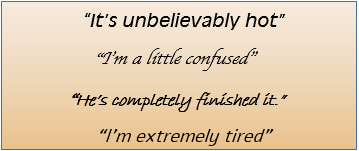Most everyday adjectives that we use in conversation are gradable. We can change the level by adding modifiers like ‘a little’, ‘very’ or ‘extremely’, for example. It helps provide more detail.
Common modifiers include: A liitle, a bit, not very > quite, fairly, pretty > very, really > extremely, unbelievably
Examples of some common gradable adjectives are: Big, small, tall, short, cheap, expensive, happy, sad, hot, cold, bored, excited, interesting, tired, tasty, etc.
She felt pretty cold when the sun went behind a cloud.
That TV show was really good.
I was extremely bored in the meeting.
The play was unbelievably dull.
Non-gradable: extreme adjectives
Some adjectives already include the idea of ‘very’ in their definitions. We don’t use modifiers like ‘very’, ‘a little’, and so on with these. However, we can use ‘absolutely’ or ‘really’:
Modifiers for extreme adjectives: really, absolutely
Examples of extreme adjectives: fantastic (means very, very good), delicious (means very, very tasty), wonderful, amazing, awful, terrible, boiling, freezing, tiny, enormous, etc.
It was absolutely freezing last night!
That pasta dish was really delicious.
The movie was really terrible – the acting was absolutely shocking!
Non-gradable: absolute adjectives
Some adjectives are non-gradable. They can’t be ‘a little’ or ‘very’. However, these adjectives can be modified by ‘absolutely’, ‘totally’ or ‘completely’. For example, you cannot be a little dead. You are either 100% dead, or not dead.
Modifiers: Absolutely, totally, completely, 100%
Examples of some absolute adjectives include: Perfect, possible, impossible, dead, finished, closed, free, acceptable, unacceptable, etc.
Wow, this question is absolutely impossible to answer!
He has completely finished his dinner.
Your work is totally unacceptable.
ラボール英会話教室.png)
